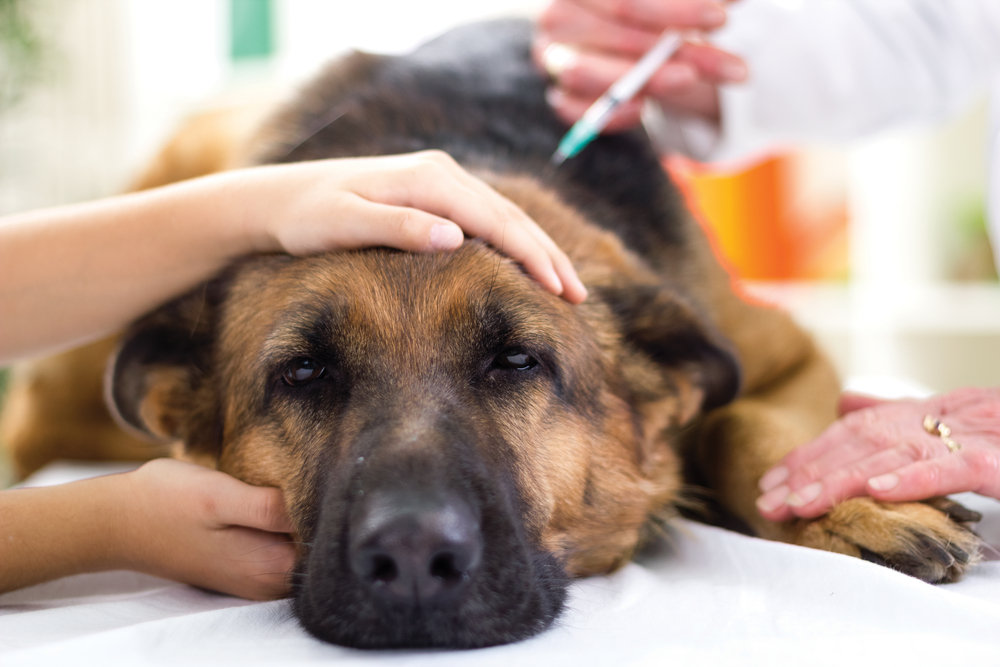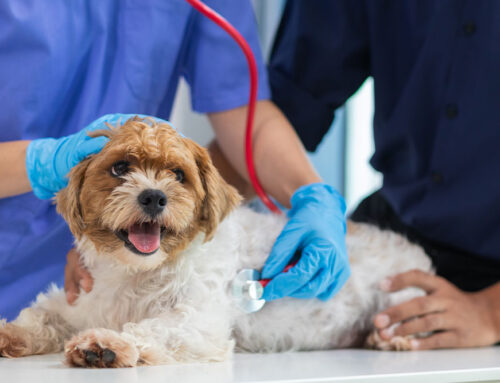We’ve all been there—you’re snoozing comfortably on the couch with your snuggly pup, when you hear the telltale rumble of intestinal sounds. In a panic, you fling off your blanket, leap to your feet, and snatch your pooch up to rush them outside, where an explosion occurs from both ends. Acute bouts of vomiting and diarrhea, or gastroenteritis, are common in pets.
Gastroenteritis is an inflammation of the gastrointestinal tract (i.e., the stomach and intestines). This vague term encompasses a number of causes, and may be associated with life-threatening illness, making accurate diagnosis crucial for proper treatment. With the vomiting and diarrhea seen with gastroenteritis, fluid loss and dehydration can quickly occur, so prompt recognition and treatment are necessary for the best prognosis.
What are the signs of gastroenteritis in pets?
Gastroenteritis signs can include inappetance, vomiting, diarrhea, and belly pain. These signs can take time to resolve and may worsen, depending on the cause. Dogs may gag and dry heave after eating and drinking. Cats and dogs may vomit food or yellow, foamy bile after emptying their stomach. Large amounts of diarrhea are often produced each day, and may be the consistency of soft-serve ice cream. Other gastroenteritis signs include:
- Tender abdomen, especially when the pet is picked up
- Lethargy
- Decreased appetite
- Low-grade fever
- Dehydration
- Listlessness
- Blood in the stool or vomit
Gastroenteritis may seem like a simple case of vomiting and diarrhea, but medical treatment is warranted to correct dehydration and electrolyte imbalances, and to determine the underlying cause.
What are the causes of gastroenteritis in pets?
Since gastroenteritis is such an all-encompassing term related to many illnesses involving vomiting and diarrhea, the causes are wide and varied, including:
- Dietary indiscretion
- Food allergies or intolerance (note: many cats are lactose intolerant)
- Viral, bacterial, fungal, or parasitic infection
- Ingestion of drugs or toxins
- Foreign bodies, such as string, toys, or household objects, stuck in the gastrointestinal tract
- Intussusception, in which the intestine telescopes into itself, causing a blockage
- Tumors or other growths in the gastrointestinal tract
- Pancreatic, liver, or kidney disease
- Diabetes
- Cancer
- Pancreatitis
- Inflammatory bowel disease
- Hyperthyroidism
- Stress
- Ulcers
Despite the extent of this list, not every potential cause of vomiting and diarrhea is included. To get to the root of the cause, your ill pet will require several diagnostic tests to ensure they receive proper treatment.
How is gastroenteritis in pets diagnosed?
Gastroenteritis is generally a diagnosis of exclusion, meaning that other potential causes for your pet’s vomiting, diarrhea, and lethargy have been ruled out. To learn the culprit behind your pet’s illness, we will obtain a thorough medical history, and may ask the following questions:
- Has your pet had any new foods or treats recently?
- When was the last time your pet ate and drank normally?
- What is your pet currently eating, and how much?
- Has your pet been exposed to any new people, pets, animals, or places recently?
- Could your pet have ingested any cleaning products, pesticides, or other chemicals?
- Has your pet had other vomiting and diarrhea episodes?
- What medications or supplements does your pet take?
After discussing changes in your pet’s life, and what they are exposed to, we will perform a physical exam to check for signs of dehydration, abdominal pain or tenderness, and bloating or gas. Armed with your pet’s vital signs, we will then run the appropriate diagnostic tests, which may include:
- Complete blood count
- Chemistry panel to evaluate internal organ function
- Pancreatitis tests
- Thyroid hormone analysis
- Fecal parasite exam
- Urinalysis
- Abdominal X-rays
- Abdominal ultrasound
This battery of tests will evaluate your pet’s internal organ function, dehydration status, electrolyte levels, infection status, intestinal parasite burden, and gastrointestinal function. We will check for urinary tract infection, organ disease, thyroid imbalance, systemic infection, diabetes, intestinal obstructions, or other probable causes of vomiting and diarrhea. Based on our diagnosis, we will form a treatment plan to address your pet’s nausea and diarrhea.
How is gastroenteritis in pets treated?

Treating the underlying cause of your pet’s gastroenteritis is vital. Depending on the cause, we may implement treatment protocols for hyperthyroidism, diabetes, pancreatitis, urinary tract infection, kidney disease, liver disease, poisoning or toxicity, foreign body removal, or parasite deworming.
To correct the electrolyte imbalance created by vomiting, diarrhea, and dehydration, we will administer intravenous or subcutaneous fluids. To halt the nausea, vomiting, and dehydration, we may use a variety of medications, including:
- Antidiarrheal medications
- Antibiotics
- Antiemetic medications
- Gastrointestinal protectants to prevent ulcers
- Pain medications
We often withhold food for the first 24 to 48 hours after treatment begins to allow the gastrointestinal tract to heal, and then slowly reintroduce small amounts of a low-fat, bland diet. Most pets show a remarkable turnaround with fluid therapy and medical treatment.
Is your pet suffering from a case of gurgling guts? We can put a stop to the piles of vomit and diarrhea in your home—schedule an appointment for our help.







Leave A Comment